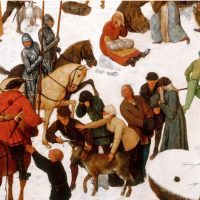000
100
%
Conflict

Pieter Brueghel l’ancien, Le Massacre des innocents (détail), c. 1565, huile sur bois. Windsor Castle, Royal Collection Source : Wikimedia Commons, Domaine public
Présentation
While societies at war are by definition societies in tension, war is also a perennial factor permeating societies in peacetime, whether in terms of mobilising factories and minds to prepare for it or rebuilding and refounding after its devastation, cultivating its memory, judging ‘traitors’ or fighting a hypothetical ‘enemy within’.
Beyond this, the research area encompasses the study of ideological divisions in the broadest sense. The aim is not only to take into account violent forms of ideological confrontation such as civil and/or religious wars, but also to examine more muted ways of regulating tensions, which bear witness to the many divisions that fracture societies beyond the equilibrium that allows them to function. Even the most consensual societies are the product of struggles for power, disputes over the definition of legitimate norms, clashes of ideas and the more or less obligatory acceptance of a balance of power, with winners and losers.
The field Conflict aims to study the history of societies in tension, i.e. societies plunged into situations of conflict that undermine their cohesion, their equilibrium, their functioning, and even the very principles on which they are founded. The chronological field considered ranges from the fifteenth century to the contemporary world.
Thématique 1
Modern wars and contemporary conflicts, total wars and low-intensity conflicts
This theme aims to provide a forum for discussion and reflection on armed conflicts of all kinds, from religious wars to the ‘war on terror’, wars of colonial conquest, the two world wars, wars of decolonisation and asymmetric conflicts, not to mention the Cold War. Transnational and global approaches are particularly appropriate for opening up the subject of war, which needs to be considered not only in its purely military terms, but also in its political, cultural, economic and social dimensions.
Thématique 2
Ideological Debates; culture wars, intellectual controversies and uses of the past
This theme aims to explore the various forms of more or less veiled conflict surrounding the definition of the legitimate norm in modern and contemporary societies, on issues relating to politics, society, culture and memory. The major political causes, social struggles, culture wars, memorial controversies and intellectual quarrels are all eligible subjects for tackling this dimension of the history of conflict.
Thématique 3
Exercising and Challenging Authority: masculine and feminine questions of power
This theme spans all forms of authority in modern and contemporary societies, at all levels of organisation, by considering the ways and circumstances in which they are developed, represented, perceived, as well as the reactions they incite. Female power, a subject that has actively occupied researchers for nearly two decades in France, is the focus of this theme. The exercise of authority and the resistance to power constitute a topic that invites interrogation of the issues of authority and, in this context, the duality of the masculine and the feminine. The topic aims to explore various forms of more or less understated conflict surrounding the definition of legitimate norms in modern and contemporary societies, addressing issues relating to politics, society, culture and memory.
Thématique 4
Conflict, Society, and Territory in the Extreme
This theme is mainly driven by the CIM (Conflits Innovations Montagnes-UGA) chair, which aims to develop collaboration with the mountain troops of the 27th mountain infantry brigade, in conjunction with the ITTEM labex (Innovation et Transitions Territoriales en Montagne) at Grenoble-Chambéry. The goal is to explore the role of the natural environment in the strategic, tactical and logistic adaptations of armies and the art of war. The topics of the armed body, traversing, and verticality are developed, with an emphasis on the role of military practices and expertise. MarchAlp, CArMo-Mont Aiguille projects.
